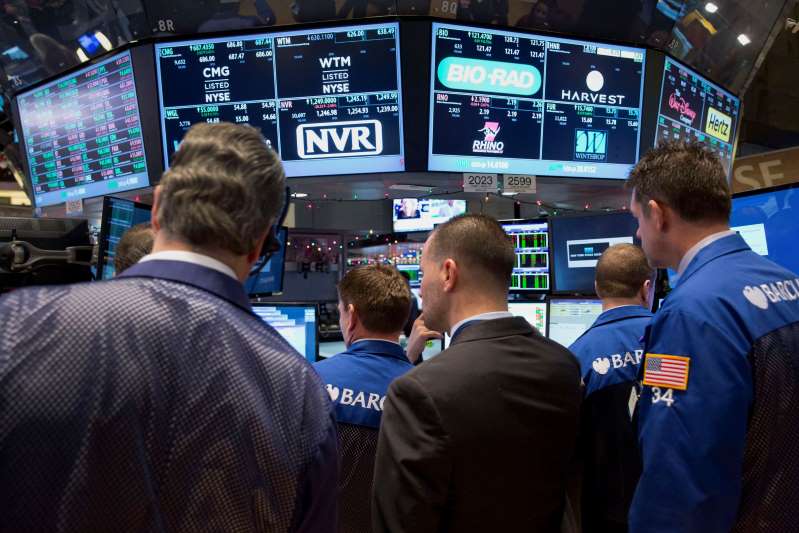By Fred Imbert and Thomas Franck, CNBC–
Stocks rebounded aggressively from a three-year low Tuesday as traders hoped U.S. lawmakers were close to an agreement on a stimulus bill to rescue the economy from the damage caused by the coronavirus.
The Dow soared 2,112 points to close 11.3% higher, notching its biggest one-day percentage gain since 1933. The S&P 500 rallied 9.4% for its best day since October 2008. The Nasdaq surged 8.1% in its best day since March 13. Both the Dow and S&P 500 were coming off their lowest levels since late 2016.
Chevron gained more than 22% to lead the Dow higher. American Express and Boeing also rallied more than 20%. Energy was the best-performing sector in the S&P 500, soaring 16.3%, while industrials and financials each jumped more than 12%.
The market breadth was overwhelmingly on the positive side in a good sign this comeback could have legs. Advancers led decliners on the New York Stock Exchange by 12 to 1.
House Speaker Nancy Pelosi told CNBC’s Jim Cramer there is “real optimism” in Congress over a stimulus deal being reached. “We think the bill has moved sufficiently to the side of workers,” she said.
“From a market perspective . . . it feels like we’re coming to the end of it,” Michael Novogratz, the CEO of Galaxy Digital, said on CNBC’s “Squawk Box.” Novogratz started buying into this market on Monday, he said. “It doesn’t necessarily mean the market’s going to go up, but a lot of that crazy volatility is kind of coming out.”
Tuesday’s moves followed yet another stormy day Monday as investors swung back to pessimism and pushed the major indexes to new multiyear lows as a procedural vote in the Senate on a bill failed for the second time in 24 hours.
The Dow dropped 582.05 points, or 3%, to a three-year low Monday and was on pace to clinch its worst calendar month since 1931. The S&P 500 dropped 2.9% and was more than 30% from a record close set on Feb. 19.
“The recent disorderly market action has left scars on most money managers,” said Sean Darby, global equity strategist, in a note. “Bear markets are brutal and they typically presage a recession.” However, Darby pointed out that a number of “risk indicators are peaking with only credit spreads misbehaving,” suggesting a bottom may be nearby.
Stocks hardest hit by the shutdowns resulting from the coronavirus led the gains Tuesday. Shares of Wynn and MGM Resorts were both up more than 15%. Delta Air Lines jumped more than 21%. General Motors shares, meanwhile, climbed nearly 20% after the automaker announced it will draw about $16 billion from its credit facilities to mitigate the coronavirus’ impact.
The Cboe Volatility Index (VIX) dipped 0.67 points, or 1.2%, to 60.85. Last week, the VIX eclipsed its financial crisis high, closing at 82.69.
Democrats criticized the $500 billion fund that the Republican proposal sets aside for distressed businesses, calling it a bailout fund “with no strings attached.”
Tuesday’s gains also came as President Donald Trump signaled he was eager to reopen the economy, despite concerns of public health officials. “We’re opening up this incredible country. Because we have to do that. I would love to have it open by Easter,” Trump said on Tuesday.
Markets are getting support from the Federal Reserve, which said Monday it would embark on an open-ended asset purchase program. The central bank said the program will run in the “amounts needed to support smooth market functioning and effective transmission of monetary policy to broader financial conditions and the economy.”
“This market has been utterly dangerous since February,” wrote Fundstrat’s Tom Lee in a note Tuesday. “But there are glimmers of hope.”
More than 400,000 cases have been confirmed worldwide, including over 50,000 in the U.S., according to Johns Hopkins University. So far, more than 600 deaths related to the coronavirus have been confirmed in the U.S.
To be sure, some strategists on Wall Street were skeptical about Tuesday’s jump. Nikolaos Panigirtzoglou, a managing director at JPMorgan, noted there could be “considerable short covering from here,” which would temporarily lift equity prices.
CNBC’s Eustance Huang contributed to this report.


Leave A Comment
You must be logged in to post a comment.